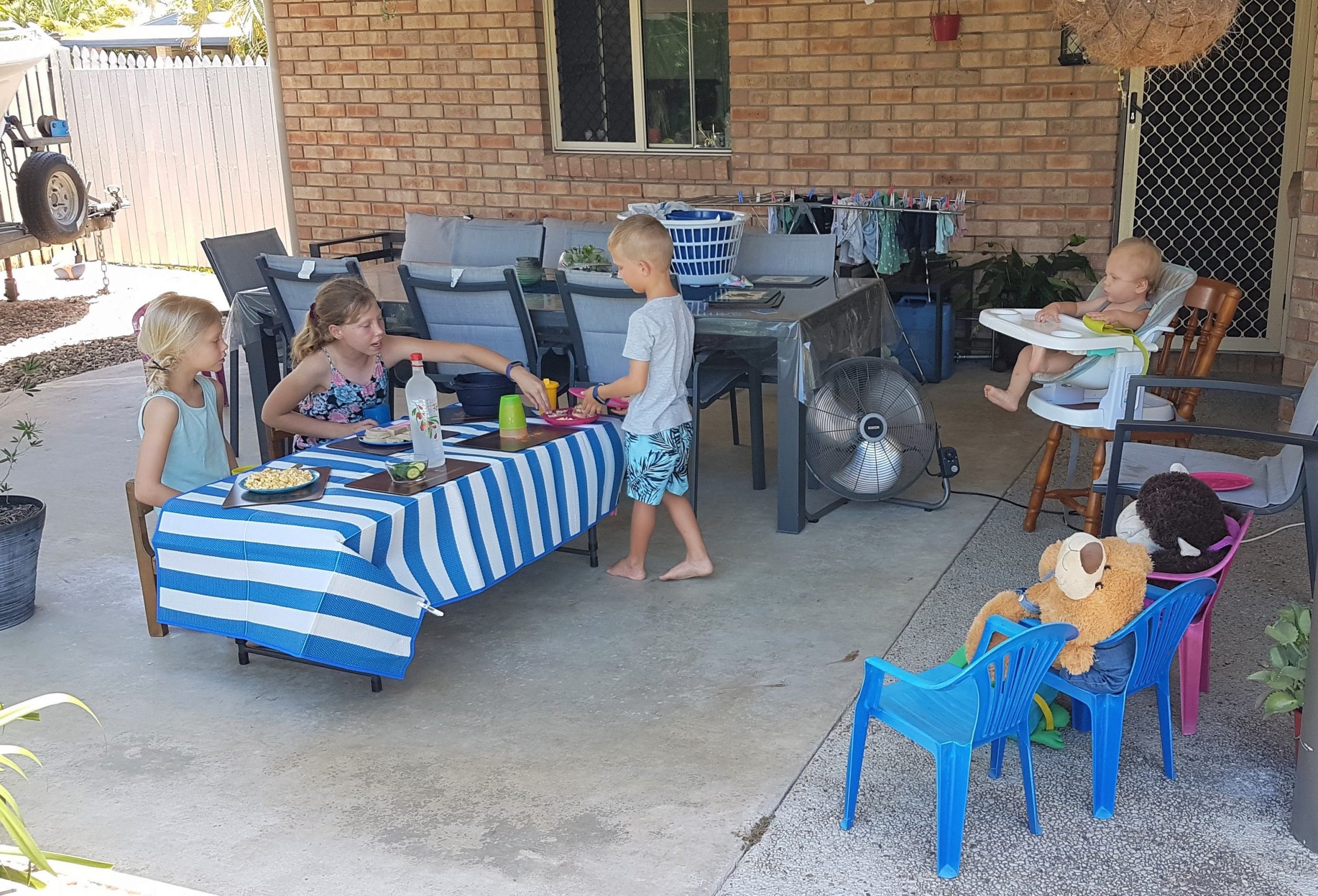The Year the World Stood Still
These holidays are going to look a bit different to what’s normal for us. Usually we would have been eagerly planning for a getaway in the camper, getting everything organized with packing and pet sitting. Instead, we are going to spend time focusing on family connection at home, as well as hopefully getting those much-needed odd jobs done around the house.
We are living in uncertain times, where changes are happening daily, and our children’s schooling is of great concern to many. There are memes and videos circulating on social media showing the struggle parents are having with homeschooling their
children, many quite humorous and entertaining. Behind the mask of humour though, there seems to be a great deal of apprehension and anxiety towards being in isolation with school-age children. We thought we would share some tips and activities to help make this time enjoyable, and far less daunting.
Our Top Tips for Greater Success:
Before you do anything else, start with making a schedule for your week. Kids (and adults) often thrive on routine as it helps everyone to know what is expected. Make sure you schedule in focused study time, brain breaks, and family bonding time.
Stick to a good routine and avoid getting into holiday mode. Encourage early to bed and getting up ready for a normal school day. Having a school-time mindset can help with achieving your goals.
Look at this time with a positive mindset rather than as a burden or inconvenience. Think of the positive family bonding and memories that can come from this.
Throughout your schedule, make sure you have “parent involved” and “individual” activities. We often find that if we spend a period of focused time with the kids, they will then be more likely to be content to do individual activities without too much nagging. While the kids are doing their individual activities, then that can be a chance for you to get your own work done. Alternate between the two types of activities, and you may find that your individual time is more productive.
Minimize the use of technology. During the “school” day, try and only use technology for educational purposes. Try and avoid using technology as a reward, as it is harder to break the habit once kids get hooked on it. If you have to, lock them away for a period of time.
Keep the lines of communication open with your boss and see if you can be on lighter loads where possible so you can have focused time with your kids.
Lastly, remember, school is not all about the workbooks. Use this time to focus on “life-learning”. You don’t need to be a trained teacher to educate your children about life – you got this!
25 Life-Learning Activities for Home:
- Lego is one of those time-less, age-less activities that has so many benefits for kids. Building a new kit is a great way for kids to learn to follow instructions, as well as learn spatial awareness. It teaches them persistence and gives them a sense of achievement. Don’t leave it at that though, giving the kids a big tub of mixed Lego is a great way for kids to use their own creativity and imagination. Take away the instructions and let them become the creators. Suggest for them to create a scene from one of their favourite books or design their own new-age vehicle. The options are endless!
- Once the kids have finished building their Lego creations, why not let them have a go at creating their own stop-motion animations. There are various apps available to help with this.
- Cooking is one of those life-skills that every child should have a basic understanding of. Why not try some baking with the kids, getting them to learn to read the recipes and understand various measurements. Spend time teaching them about kitchen safety, and how to use the various appliances under supervision. The best part about this activity is the focused bonding, and the reward of yummy food!
- Being stuck in isolation for 2 weeks is a great opportunity to start a new book series. Find something that will interest everyone and enjoy getting lost in the pages of imagination. Encourage your kids to also spend time reading individually as some quiet down time.
- Getting outdoors into the garden can do wonders for everyone. Research what plants grow best at this time of the year, and get the kids to make their own garden, whether it be veggies or flowers. They will love checking them daily and watching them grow, as well as reaping the reward from the harvest at the end.

- Find something to make as a long-term project. This could include sowing and cross-stitch or making a model plane.
- If owning your own pet isn’t an option, why not try fostering a pet for a short period of time. There are usually so many animals needing to be fostered while they wait for their forever homes. This could be a great way to provide your kids with some purpose beyond themselves. Animals also make great company.
- Why not try encouraging your kids to keep a journal about ‘The Year the World Stood Still’. They can write about all the activities they got to do at home, as well as share how they are feeling about all the new changes in their lives.
- If you have to be home, it’s the perfect opportunity to spring clean the kid’s rooms and declutter a bit. Get the kids to go through all their toys and sort out what they don’t need anymore.
- Since borders are getting closed, and people are being encouraged to stay home, why not write letters or emails to family members or school friends. Get creative!
- Now is the perfect time to check in on your neighbours to see how they are coping (obviously from a distance). Get the kids to make something to encourage your neighbours and brighten their day.
- Most teachers will have sent schoolwork home, so make sure you set aside allocated time for focused learning. Don’t forget to put appropriate breaks in place.
- Allow the kids to get creative with dress-ups and role-playing. Let their imaginations go as they get into character.
- Try a new hobby or bring out some of your old hobby’s and get the kids involved. These could range from photography, painting, clay, scrapbooking to building and woodwork.

- If you haven’t done it before, why not have a go at menu planning. Get the kids to help come up with ideas and plan the menu for the week. This is also a great way to help with budgeting.
- Don’t forget to get outdoors into the fresh air. Kick a soccer ball around or play some basketball or backyard cricket. It is so important to keep their bodies active. This also makes a great quick brain break between focused learning time.
- Go down memory lane and bring out the old albums or home videos. Get the kids to write or draw about some of their favourite memories.
- Have a special family date to your “home theatre” once all bookwork is completed for the day. Get the kids to do up advertising and tickets for the event as well as organize the snacks for the whole family. Pick a theme and get dressed up to make it even more special.
- Try a home restaurant and get the kids to make lunch, or morning tea for everyone and set up the restaurant inside with special lighting and music, or make it a picnic outside in the backyard.

- Pick a sunny day to clean the car. Put some music on and make it fun! Most kids love getting wet and sudsy while cleaning the car.
- Board games are an absolute favourite in our home. Find some games that the kids can do together, however also find some more challenging ones where you can join in too. Board games are a great way of teaching kids how to win and lose with a good attitude, as well as learning strategy. Some of our favourites are Carcassonne, Sequence, Monopoly Deal, Yahtzee, Greed, Uno, and Ticket to Ride.
- Set up a space where you can all work on a large puzzle over the whole week. Encourage the kids to work on it when they need some quiet time. This is a great lesson in perseverance, as well as visual spatial awareness.
- Staying fit and healthy is important for overall wellness. Try adding in a workout session to your daily routine. This can be all together or try finding kid-appropriate exercise videos that the kids can follow along to as another brain break.
- If your kids love music, allow some time for them to use creative expression, play instruments or simple sing-along to fun songs.
- Send the kids on a nature treasure hunt in the back yard. Get them to find a variety of textures, or as many varieties of leaves. They can then trace them into a book or use them to create a piece of artwork.

Remember, play to your families’ strengths, and don’t be afraid of stepping out of your comfort zone and trying something new. Enjoy family meals together and discuss how you are all coping with the changes in the world. By staying connected and showering your kids with love and life lessons, we can all get through this!
Don’t forget to share any of your great ideas!
#theyeartheworldstoodstill #trundlewith










